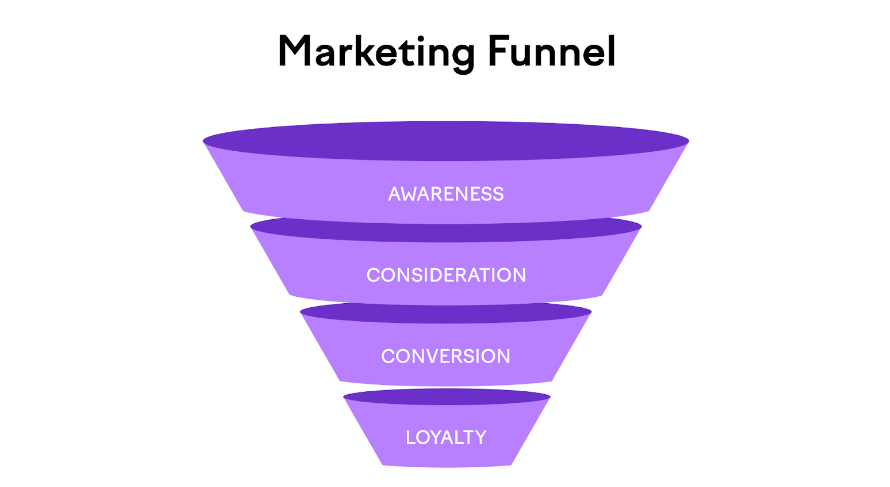Sales Funnel vs. Marketing Funnel: Differences Explained

Both the sales and marketing funnel, which symbolize a different stage of the prospect-to-customer journey, are essential components of customer acquisition in the complex business world. Together, we will dissect these two basic frameworks, highlighting their salient features, critical distinctions, and essential components determining their respective roles. Let’s take a look at the differences between marketing funnels and sales funnels.
Sales Funnel
The sales funnel, also called the purchase or conversion funnel, is a targeted model that leads prospective buyers through the distinct phases of the purchasing process. The sales funnel comprises four stages: Awareness, Interest, Decision, and Action.
The Awareness phase aims to educate prospective customers about a product or service. This entails outreach initiatives, strategic advertising, and making the first move in communication. The next stage, Interest, aims to increase the prospect’s level of involvement. At this stage, product demos, in-depth talks, and the distribution of thorough information are all considered sales activities.
As we move forward, helping the prospect make a wise decision is the primary goal of the Decision stage. This entails responding to concerns, offering tailored solutions, and assisting with decision-making.
Converting the prospect into a paying customer is the primary goal of the Action stage, which is the last phase of the sales funnel. This phase involves completing the transaction, completing the deal, and providing after-purchase assistance.
The sales funnel’s effectiveness in turning leads into customers makes it significant. Businesses can better address the needs and concerns of their customers by utilizing personalized strategies, direct sales interactions, and tailored tactics. This allows for a more seamless transition from initial awareness to final conversion.
Marketing Funnel
As an illustration of the whole customer journey from first awareness to final purchase, the marketing funnel offers a more thorough perspective. The marketing funnel, which consists of five essential phases (Awareness, Interest, Consideration, Intent, and Purchase), provides a comprehensive framework for establishing positive brand perceptions, generating leads, and increasing brand awareness.
Making potential customers aware of a product or service is the goal of the marketing funnel’s Awareness stage, similar to that of the sales funnel. Branding, advertising, content marketing, and social media platform interaction are all part of this. Moving forward to the Interest stage, we emphasize creating Interest and interaction using interactive techniques like webinars, email campaigns, and educational content.
The third step, consideration, is presenting the good or service as a workable fix. During this stage, case studies, product demos, free trials, and the development of comparative content are examples of marketing activities. Targeted offers, retargeting advertisements, and tailored communication are used in the following Intent stage to try and get the prospect one step closer to making a purchase.
The Purchase stage, the last in the marketing funnel, is where turning a prospect into a customer is the primary goal. At this stage, marketing initiatives include providing a smooth purchasing experience, offering incentives, and running promotions. Building favorable brand perceptions, creating brand awareness, and generating leads for the sales funnel are all made possible by the marketing funnel.
Key Differences
Sales Funnel
- Oriented towards closing deals and converting leads into customers.
- Involves more immediate and targeted actions to secure a purchase.
- Emphasizes direct sales activities, personalization, and overcoming objections.
- Focuses specifically on the stages from awareness to conversion.
Marketing Funnel
- Involves activities that build brand awareness, educate, and nurture leads.
- Encompasses the entire customer journey from awareness to purchase.
- Oriented towards building relationships and establishing a brand presence.
- Generally, a longer-term approach focuses on building trust and credibility.
While distinct in their functions, the marketing and sales funnels are inherently interconnected. In an effective business strategy, these funnels work collaboratively. The marketing funnel lays the groundwork by creating Awareness and Interest, smoother the transition to the sales funnel. Sales teams, in turn, leverage the groundwork laid by marketing efforts, engaging with leads that are already primed and interested.
Understanding the nuanced differences between the sales funnel and the marketing funnel is pivotal for businesses striving to refine their customer acquisition strategies. When strategically aligned, these frameworks create a synergistic approach, guiding potential customers seamlessly from initial awareness to the final conversion. By recognizing the unique contributions of each funnel, businesses can optimize their strategies, maximize customer engagement, and enhance the likelihood of turning prospects into loyal customers.




